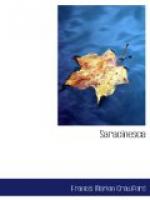But my business is not to write the history of those uncertain days, though no one who considers the social life of Rome, either then or now, can afford to overlook the influence of political events upon the everyday doings of men and women. We must follow the private carriage containing the two respectable citizens who were on their way to Del Ferice’s house.
CHAPTER XXXIII.
Now it chanced that Del Ferice was not at home at the hour when the carriage containing the detectives drew up at his door. Indeed he was rarely to be found at that time, for when he was not engaged elsewhere, he dined with Donna Tullia and her old countess, accompanying them afterwards to any of the quiet Lenten receptions to which they desired to go. Temistocle was also out, for it was his hour for supper, a meal which he generally ate in a small osteria opposite his master’s lodging. There he sat now, finishing his dish of beans and oil, and debating whether he should indulge himself in another mezza foglietta of his favourite white wine. He was installed upon the wooden bench against the wall, behind the narrow table on which was spread a dirty napkin with the remains of his unctuous meal. The light from the solitary oil-lamp that hung from the black ceiling was not brilliant, and he could see well enough through the panes of the glass door that the carriage which had just stopped on the opposite side of the street was not a cab. Suspecting that some one had called at that unusual hour in search of his master, he rose from his seat and went out.
He stood looking at the carriage. It did not please him. It had that peculiar look which used to mark the equipages of the Vatican, and which to this day distinguishes them from all others in the eyes of a born Roman. The vehicle was of rather antiquated shape, the horses were black, the coachman wore a plain black coat, with a somewhat old-fashioned hat; withal, the turnout was respectable enough, and well kept. But it did not please Temistocle. Drawing his hat over his eyes, he passed behind it, and having ascertained that the occupants, if there had been any, had already entered the house, he himself went in. The narrow staircase was dimly lighted by small oil-lamps. Temistocle ascended the steps on tiptoe, for he could already hear the men ringing the bell, and talking together in a low voice. The Neapolitan crept nearer. Again and again the bell was rung, and the men began to grow impatient.
“He has escaped,” said one angrily.
“Perhaps—or he has gone out to dinner—much more likely.”
“We had better go away and come later,” suggested the first.
“He is sure to come home. We had better wait. The orders are to take him in his lodgings.”
“We might go into the osteria opposite and drink a foglietta.”
“No,” said the other, who seemed to be the one in authority. “We must wait here, if we wait till midnight. Those are the orders.”




